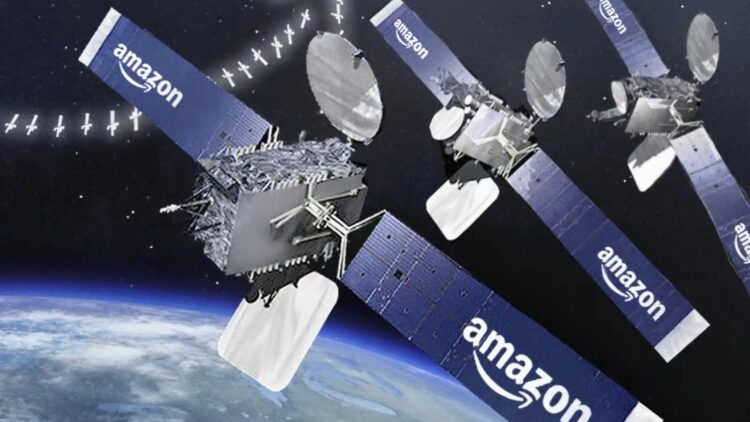Goodbye to SSI payments the $967 Supplemental Security Income check for June has not been deposited for many here s why
Goodbye to this Amazon product One of the company s best-selling products has been recalled due to a lethal danger to consumers, and the CPSC has issued an urgent warning in the US
Goodbye to car security a teenager manages to steal a vehicle in just 13 seconds, exposing the vulnerability of current systems
Amazon is working on a satellite project of its own. It now aims to overtake SpaceX and take control of space in addition to controlling the internet. Yes, a significant accomplishment.With the successful launch of 27 more devices into space, it has doubled its constellation of Project Kuiper satellites, escalating its direct competition with Starlink.Things are getting exciting in the space race!
The new satellites were launched into low Earth orbit by Atlas V, which departed Florida early Monday, increasing the current Kuiper total to 54 units! Even though it’s still a modest quantity in comparison to Starlink’s 7,500+ satellites, it’s a significant step toward the e-commerce behemoth’s goal of providing worldwide connection.
Mission: conquer space
The KA-02 mission represents a pivotal point in the deployment of the Kuiper network. It went off without a hitch and marks a major advancement in a project that has been underway for more than two years. This places Amazon squarely against Elon Musk in the satellite internet business.
A successful launch
United Launch Alliance (ULA), Amazon’s primary partner for this stage of the project, carried out the launch, which began at 6:54 a.m. (local time) from Cape Canaveral Space Force Station. According to the corporation, control was moved to its operations center in Redmond, Washington, where the new satellites’ startup is being tracked, once the launch phase was finished.
This mission marks a turning point even though it was Kuiper’s second flight following the first one in April, which also launched 27 satellites into orbit. Amazon has already taken the first step in achieving their goal of deploying up to 3,263 satellites in the upcoming years.
Amazon vs Starlink: David vs Goliath
With a rapid rate of launches, Starlink has jumped ahead of Amazon, which has chosen to roll out more gradually. The difference has grown significantly in just two years: 54 Kuiper satellites compared to over 7,500 from Starlink. Whoa.
Bezos isn’t giving up, though. Amazon is certain it can catch up, and it aims to launch up to 76 missions in the upcoming years. However, it has held things down by continuing to work with ULA rather than utilizing rockets from its own business, Blue Origin.
What s at stake?
This contest is about who will manage the next major global infrastructure—the space-based internet network—beyond the corporate pride that comes with deploying more than a thousand satellites into the sky. Satellite connectivity promises to provide internet access where terrestrial infrastructure cannot, such in distant areas and combat zones. And a portion of the planet’s digital future will belong to whoever controls that network. You understand now?
What s next for Project Kuiper?
Although Amazon has not disclosed the exact dates of its upcoming debut, some predict that the first user ground testing will start in the upcoming months.
Additionally, this move creates new chances for its Prime Video, AWS, and Alexa product ecosystem. Amazon might incorporate premium satellite-based services, enhancing its position in the entertainment and technology industries.
Global internet
Progress is becoming apparent, despite the fact that Project Kuiper is still in its infancy in comparison to Starlink’s orbiting empire! Despite being late to the game, Amazon has demonstrated that it is serious and prepared to play hard. Therefore, Musk, don’t get too comfortable since Bezos is a new competitor in the quest for global connectivity.
SpaceX vs. Blue Origin
| SpaceX | Blue Origin | |
| Founder | Elon Musk | Jeff Bezos |
| Founded | 2002 | 2000 |
| Mission | Colonize Mars, reduce space travel costs | Enable millions to live and work in space |
| Launch Frequency | High (over 90 launches in 2023) | Low (only a few launches per year) |
| Human Spaceflight | Regular missions via Crew Dragon (NASA + private) | Suborbital tourist flights with New Shepard |
| Orbital Capability | Yes (Falcon 9, Falcon Heavy, Starship) | Not yet (New Glenn under development) |
| Moon Missions | NASA s Artemis program: Starship as Human Landing System | Lunar lander selected but not yet launched |
| Satellites Network | Starlink (internet constellation, >5,000 satellites) | Project Kuiper (in early deployment phase) |
| NASA Contracts | Multiple contracts (Commercial Crew, Artemis, etc.) | Selected for lunar cargo missions and Project Kuiper |
| Innovation Focus | Fast iteration, rapid testing, heavy launch payloads | Gradual development, emphasis on safety and reusability |
| Public Engagement | Very active, livestreams, social media presence | Less public-facing, quieter marketing strategy |




